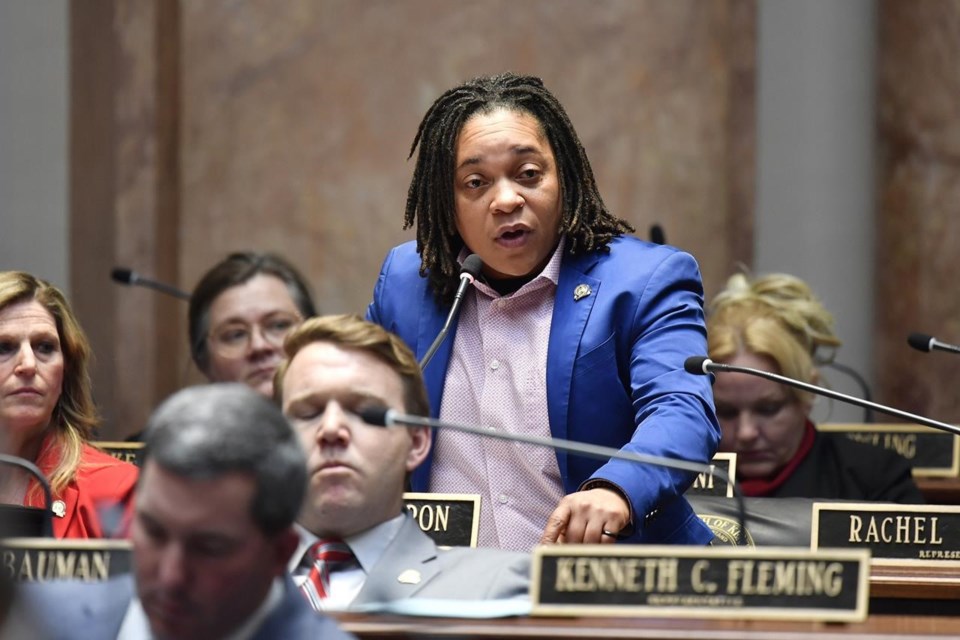FRANKFORT, Ky. (AP) — Republican lawmakers in Kentucky passed a measure Thursday to ban gender-affirming care for transgender minors, completing whirlwind voting on a repackaged proposal that triggered outrage and tears among opponents unable to stop the sweeping policymaking on a culture wars issue.
Supporters of the proposal — which affects how gender is discussed in schools — beat a Thursday deadline to retain their power to override an expected gubernatorial veto.
GOP supermajorities in the House and Senate overwhelmingly passed the bill, a day after a slimmed-down version had stalled in the Senate and seemingly left the issue in limbo. A cascade of shouting erupted from some bill opponents in the Senate gallery after the measure won final passage.
The bill's foes denounced the fast-track maneuvering and the expanded measure's consequences for trans youths. Overcome with emotion, a sobbing Rep. Josie Raymond said children would be harmed. “I'm embarrassed and I'm appalled and I'm scared,” the Democrat said in opposing the bill in committee.
Republicans backing the far-reaching rendition cobbled together a separate bill that hastily cleared a committee and won House passage. It gained Senate passage a short time later, sending the bill to Democratic Gov. Andy Beshear, who portrayed it as government intrusion in family health decisions.
Republican House Speaker Pro Tempore David Meade, in presenting the revived bill in committee, said: “Our job is to protect children, and that’s what we’re doing here."
“Surgery or drugs that completely alter their life, and alter their body, is not something we should be allowing until they are adults,” Meade said later during the House debate.
The American Civil Liberties Union of Kentucky quickly warned that it “stands ready” to challenge the measure in court if it becomes law.
"Legislators cannot erase transgender people from existence, and we will continue to fight for equal rights and equal protection under the law,” said Amber Duke, the organization's interim executive director.
The new bill designated to carry the sweeping trans-related provisions retained its original language — allowing teachers to refuse to refer to transgender students by their preferred pronouns and requiring schools to notify parents when lessons related to human sexuality are going to be taught.
Multiple layers were added to it — including the proposed ban on gender-affirming medical care for trans youths. It would outlaw gender reassignment surgery for anyone under 18, as well as the use of puberty blockers and hormones, and inpatient and outpatient gender-affirming hospital services. It would not allow schools to discuss sexual orientation or gender identity with students of any age.
The House passed the bill on a 75-22 vote. One after another, opponents stood to denounce the bill while supporters were mostly silent. Democratic Rep. Keturah Herron called the bill “an attack on a very, very, very small population of people.”
The debate was shorter but no less fiery in the Senate, which passed the bill 30-7.
“This is absolute, wilfull, intentional hate. Hate for a small group of people that are the weakest and the most vulnerable among us,” said Democratic Sen. Karen Berg.
The bill’s supporters say they are trying to protect children from undertaking gender-affirming treatments that they might later regret as adults.
“We're talking about removing healthy body parts that you cannot put back on," Republican Sen. Lindsey Tichenor said in supporting the bill. “I've seen the pictures. It's horrifying.”
Thursday was the last day Kentucky lawmakers were in session until late March, when they'll reconvene for the final two days of this year's session. By beating the Thursday deadline to send the bill to the governor, the GOP supermajorities retained their ability to override a veto.
Beshear, who is seeking reelection this year, said such bills amount to “big government stepping in and imposing its will” on health care decisions that should be left to families.
“I also believe that every child is a child of God — every single one,” the governor said Thursday at his weekly news conference.
The expanded version was in stark contrast to the more limited version that stalled Wednesday in the Senate. That version pared down the restrictions on transgender youth, their families and health care providers.
The issue has spurred emotional debate from bill opponents who call it discriminatory and say it would hurt transgender youth. On Tuesday, a former Kentucky lawmaker said his young grandchild would be among those affected if lawmakers banned access to gender-affirming medical care for those under 18.
“This bill condemns vulnerable children to an even more difficult life than they’ve already been born into,” Jerry Miller, a Republican who formerly served in the House, told lawmakers. “Please don’t let a parent’s right to protect their children be collateral damage in the culture wars.”
Nationally, state lawmakers are approving extensive measures that restrict the rights of LGBTQ people this year, from bills targeting trans athletes and drag performers to ones limiting gender-affirming care. In Mississippi, Republican Gov. Tate Reeves recently signed a bill to ban gender-affirming hormones or surgery in the state for anyone younger than 18. The Republican governors of South Dakota and Utah have signed bans on gender-affirming care this year.
Bruce Schreiner, The Associated Press


